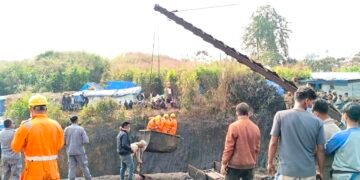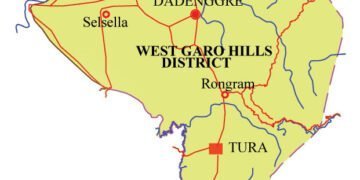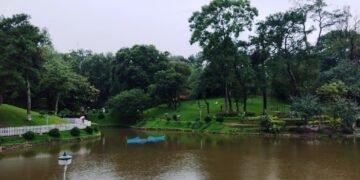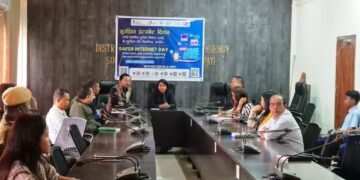At home and outside the household, the beneficiary family would host the ceremony to pay obeisance to the deities of agriculture and other activities beyond the domestic border, known as ‘Lei Khyrdop Lei Kharai’ for the well-being of the family and protection from calamity. In all of these ceremonies, there is a separate ceremonial practice that involves the adjacent land where the same or other clan members in the neighbourhood must be engaged. The ceremony is known as ‘Saiñbri’ and involves the traditional administrative heads and the heads of both households, usually the eldest maternal uncles of each family.
The custom defined the boundary between the adjacent households, with a wide strip of land along the boundary known as ‘Samraij’ demarcated to prevent any dispute and both parties are not allowed to encroach upon that portion of the land. In other words, it is like a no man’s land concept in contemporary international political concurrence. These administrative guidelines go along with the consent of the Sylvan deities through propitiation and other relevant rituals. These ceremonies are performed by a priest in the presence of nobles and the chief of the province, and both households are required to attend and be enlightened about the guidelines and their legitimate boundary.
In Khasi custom, it involves intrinsic ceremonial practices with pragmatic social regulation on properties under the legitimate political administration of the council of nobles or Dorbar Ki Bakhraw- an apex provincial council or Dorbar Hima. The ceremony started with the mother or eldest daughter in the house seeking the endorsement of the home deity within the domestic sphere. Then the mother, as the custodian of family property, would hand over the responsibility to her maternal uncle or eldest maternal brother to continue the performances outside the domestic boundary.
At the actual line of demarcation between the adjacent properties, the maternal uncles from both sides would be engaged in the negotiation and definition of the boundary supervised by an authorised person in the presence of the priest and other administrative heads. The authorised person, with the consent of the administrative heads, would identify the boundary posts or Mawbri of both sides and seek the agreement of both representatives, before handing over to the priest to propitiate to the Sylvan deity with the final rituals.
When both the spiritual and administrative formalities are over, all the witnesses and attended people are required to partake in the feast prepared by both families. All those who are present during the ceremonial and customary practices are required to partake in the feast on both sides of the family without discrimination or any other partisan exclusion to ensure harmony and tranquility in the territory.
It is customary to cultivate congeniality in both families and it is usually believed that the deities would not tolerate any partial engagement, even without any ulterior motive. If there is any accidental or careless negligence of the custom, it may lead to disastrous consequences, which reflect the disruption of the divine decree. ‘Saiñbri’ is the tradition of community allocation of land for legitimate utility through socio-political regulation to inculcate harmony within the clan and among various clans in the neighbourhood.
In retrospect of the core elements of Khasi thoughts, mother-earth is the source of all beings on earth that has, through several elementary sources of fundamental customary practices, depicted the mother as the most revered and sacred entity. The culture transpired into the origin of the matrilineal system of clan lineage and the other aspects of the mother as the core of existence and sustenance of every life on earth.
Every culture in the world subconsciously observes the essence of the mother as the origin of all creation, reproduction, and subsistence. This is reflected in various words like mother-earth, mother-nature, motherland, and mother tongue; and even advanced technological devices use the word motherboard in every computer hardware. There is hardly any nation and culture in the world that is devoid of these basic terms.
The custodianship of ancestral properties, including land, is the original concept of management of natural resources. However, after several years, particularly after the onset of British colonial rule, the tradition transformed into the idea of ownership over properties in violation of the essence of reverence towards the mother earth or Mei Ram-ew. Since the beginning of time, Mother Earth or Mei Ram-ew has been perceived as the mother of the five elements of energy – Sun, Moon, Air, Water, and Fire. While the sun, moon, air and water prevailed elsewhere in the universe, including on the surface of the earth, the fire is embedded within the earth and stone. The forces of this elemental energy facilitated the creation of living organisms on earth, ranging from plants to insects, birds, animals and human beings.
The original Khasi folk concept of mother-earth being the owner of every other creation in the universe is being usurped by human beings to stake a claim of ownership over the land and all other resources on earth and beyond. The alien notion of materialistic categorisation of resources has further escalated into trading and commerce, even as the purposes of utilisation of resources are the same in the ancient system. The so-called civilisation brought about by the British colonial rulers has devastated the spiritual essence of reverence towards land and other natural resources.
Today, land and natural resources are assessed in terms of monetary value, with lucrative potential for generating wealth. There was a time when people communicated with plants and other creatures through divine intervention, which was ridiculed in modern days as superstition. Prayers are invoked before the sowing season to appease the deities and, similarly, before the harvest season, prayers are offered as obeisance to the deities for the prosperity earned by society.
In the construction of huts or other social infrastructures, prayers are invoked for divine sanction on the utilisation of stone, wood, thatch or any other natural resources for the purpose. In the folk hunting tradition, prayers are invoked for divine sanction on the need to catch fish from the river or animals from the jungle for human consumption. Likewise, every other utilisation of natural resources requires proper permission from the creator and endorsement by the respective deities.


























